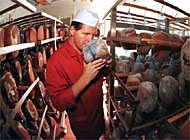Switzerland bans beef imports from Argentina

Switzerland has banned imports of beef from Argentina in the wake of the scare over foot-and-mouth disease. The move comes a day after Bern slapped a ban on all livestock imports from the European Union.
The Federal Veterinary Office said in a statement that it was following an EU suggestion to member states to temporarily ban beef and milk products from Argentina.
Buenos Aires has confirmed one case of the highly contagious disease, and says it suspects there may be two others. Last year Switzerland imported 30,000 tonnes of beef from Argentina.
On Tuesday, Switzerland decided to close its borders to cloven-hoofed animals from the EU after France announced its first discovery of foot-and-mouth disease.
“We are taking the drastic action of banning the main source of infection which is live animals,” Heinz Müller, a spokesman at the Federal Veterinary Office, told swissinfo.
Müller said Swiss imports of livestock from the EU are very low, adding that the ban was “a formal action.” Sixteen cows were recently taken to France to attend an exhibition and they are now in quarantine in Switzerland.
Some 182 sheep and goats have been imported from the EU in the past six to 12 months.
Switzerland has not banned the import of beef products from the EU. Müller said that because of swift French action to prevent the spread of the virus, he saw no reason for Switzerland to do so.
However, the Swiss Farmers’ Association has called on the government to impose an immediate ban on all meat and milk products.
“Our opinion is that all imported food poses a health risk and must also be banned,” Heiri Bucher from the Swiss Farmers’ Association told swissinfo. “This might include meat and milk products.”
The French farm ministry reported that tests on a herd of 114 cattle at a farm near the village of La Baroche-Gondouin in the northwest of France were positive.
“In the past few weeks of February, we have imported 20,000 sheep from Britain and the tests which have been carried out afterwards showed that a very large number of these sheep – at least half of them – were carrying the virus,” said the farm minister, Jean Glavany.
“These sheep were dispatched to about 20 French departments. So they might possibly have transmitted the virus to others.”
Earlier this month, France ordered the slaughter of 20,000 sheep imported from Britain after February 1 along with 30,000 French sheep that had come into contact with them.
Paris also slapped a two-week ban on the export of all animals at risk from the disease.
The Swiss ban on EU livestock follows similar measures introduced by Belgium and the Netherlands.
Foot-and-mouth disease, which affects sheep, pigs, goats and cattle, first broke out in England last month and spread like wildfire across the country.
The disease has been detected at more than 183 sites and an estimated 16,000 animals have been slaughtered or are due to be put down.
swissinfo with agencies

In compliance with the JTI standards
More: SWI swissinfo.ch certified by the Journalism Trust Initiative
You can find an overview of ongoing debates with our journalists here. Please join us!
If you want to start a conversation about a topic raised in this article or want to report factual errors, email us at english@swissinfo.ch.